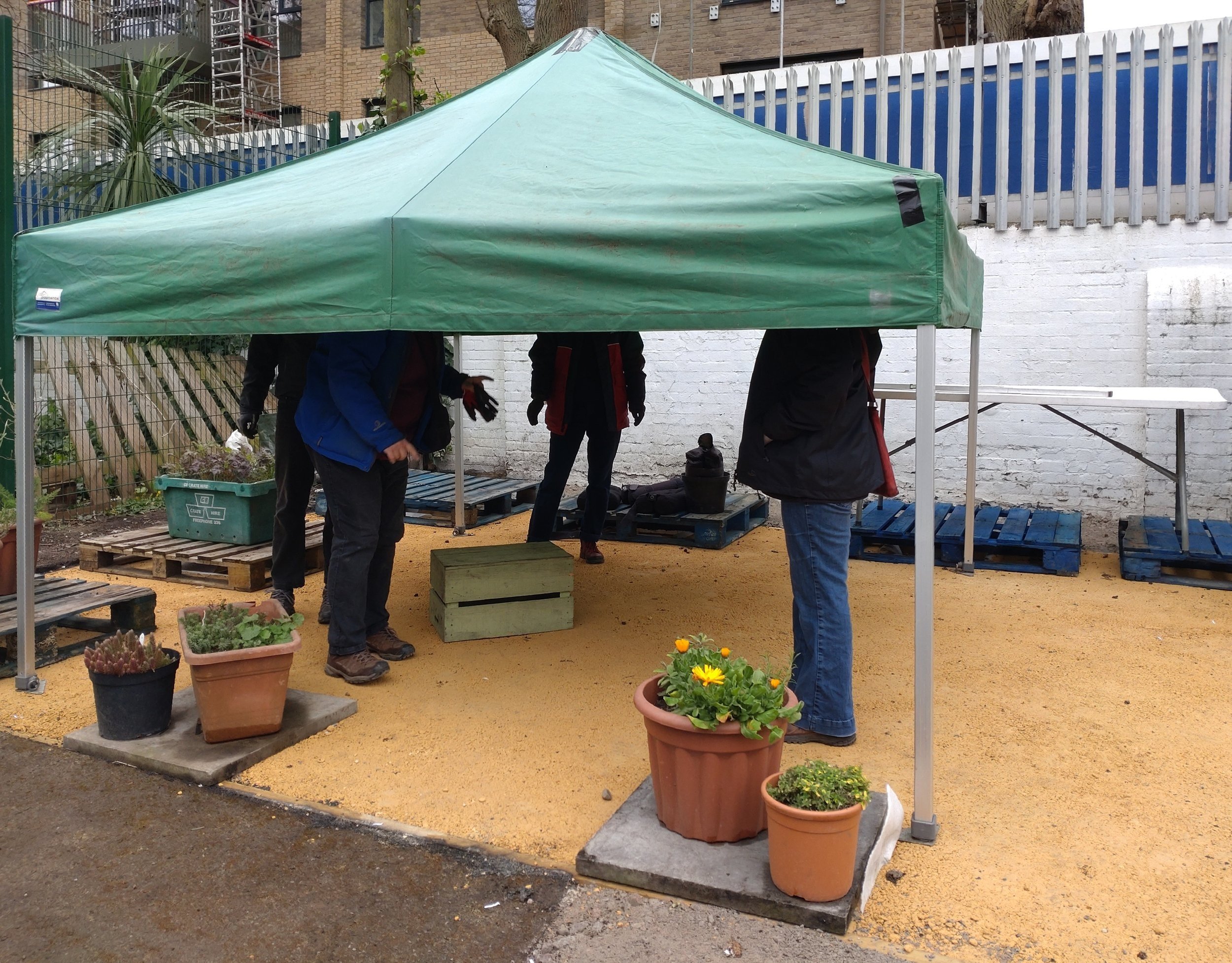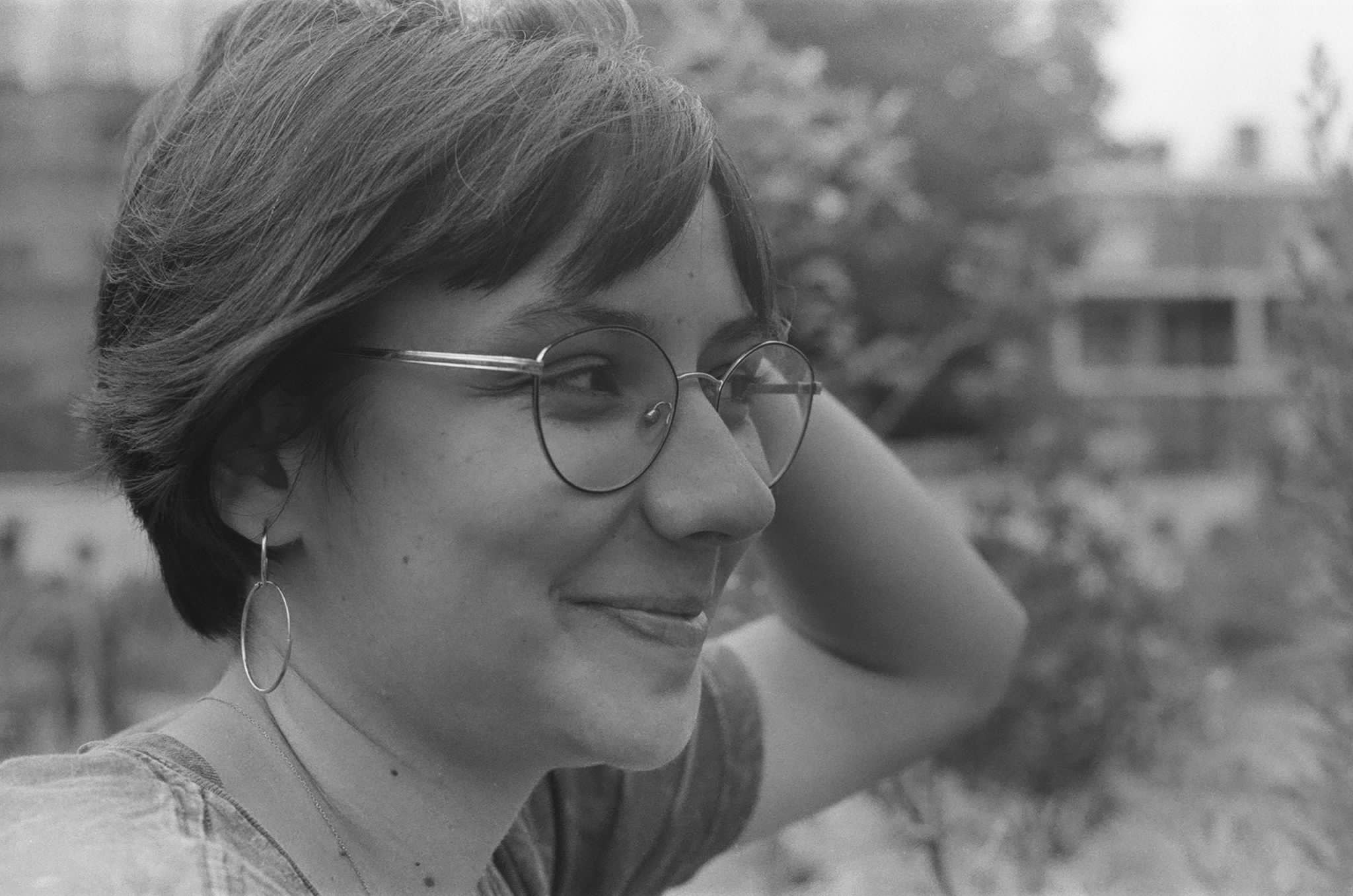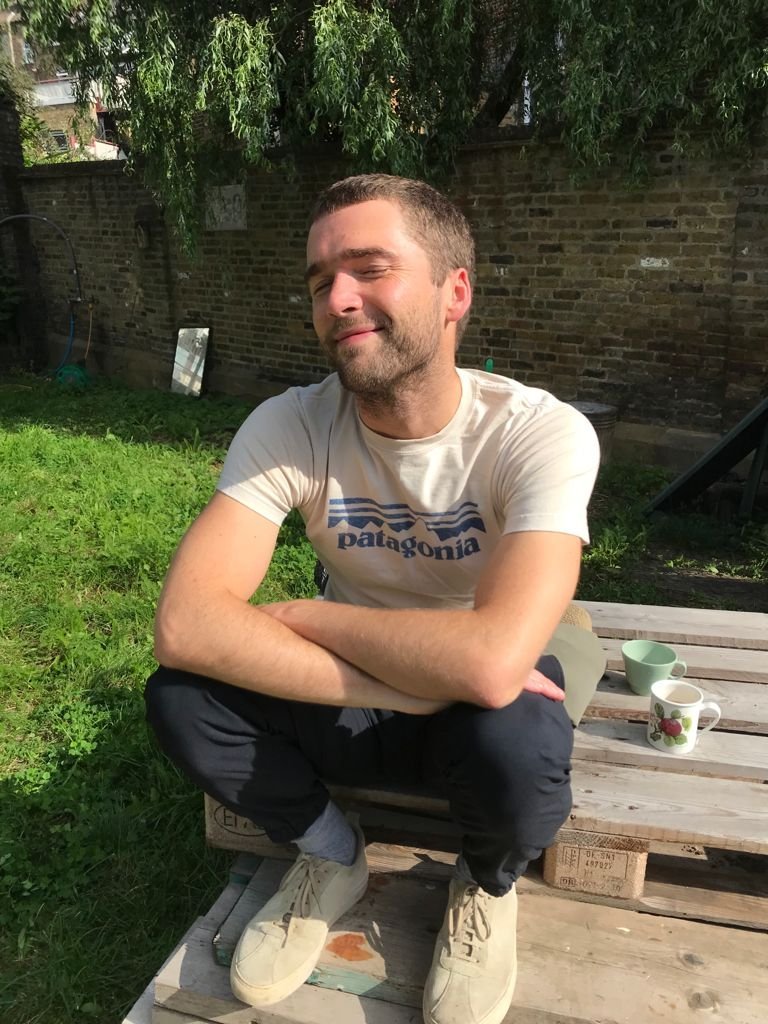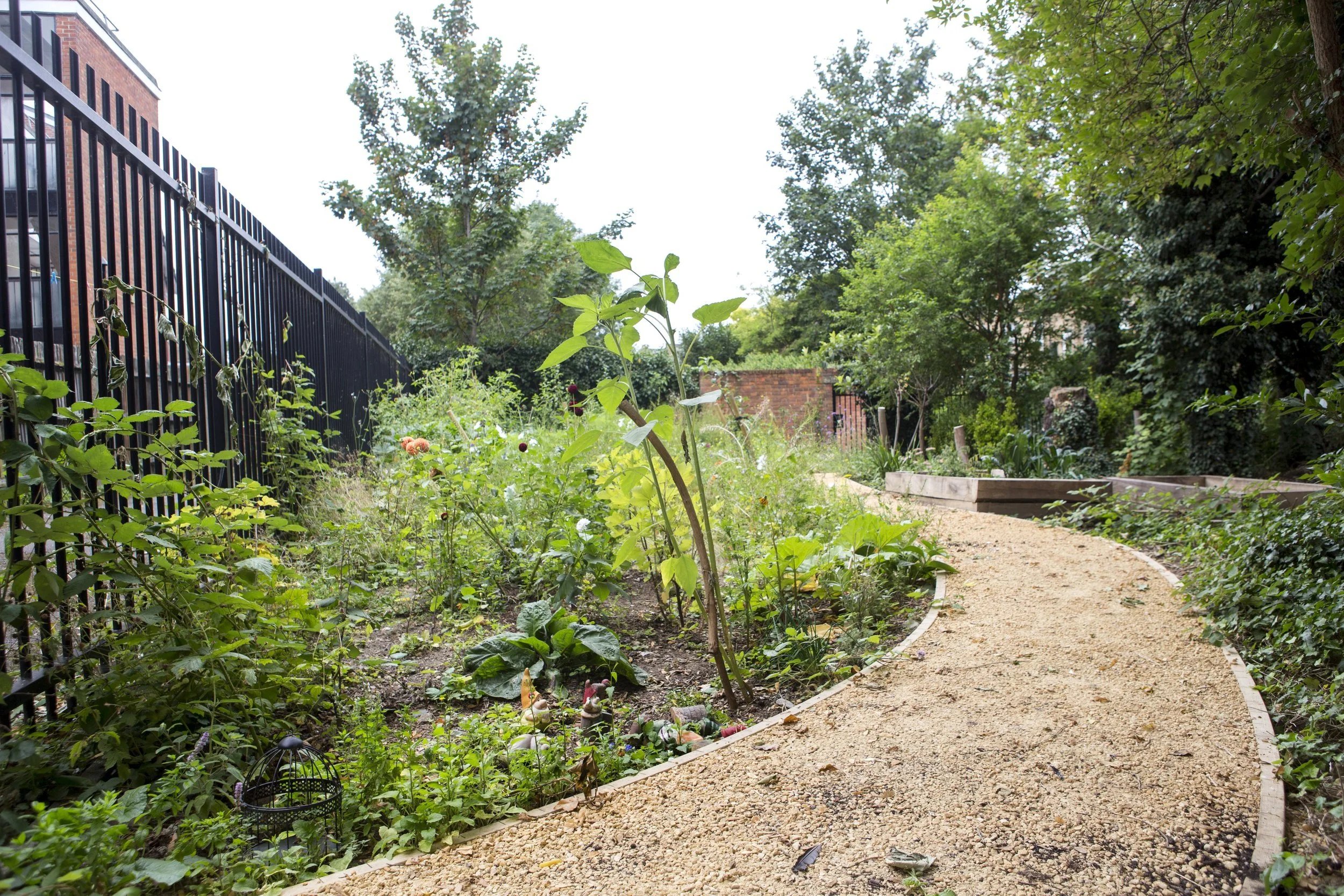Action for Local Food Stories
Hear from some of the people involved in making change happen in Islington.
Paula - Community Growing Activist
“I became interested in urban gardening during lockdown, when along with some neighbours, I campaigned to have a closed community garden space re-opened on my estate. I was delighted to have access to some green space – but had no idea what to do with it. I had never had a garden, or grown vegetables, and so didn't really know where to start.
In Sept 2021, I heard about the Octopus Community Plant Nursery, and started attending weekly 'sowing and growing' sessions. I immediately felt very welcome, despite my complete lack of gardening knowledge. Each week, I learn something really useful: about seeds, sowing, potting on, planting out, harvesting, soil health, composting... the list is endless.
I share this knowledge, and the many seeds, bulbs, seedlings and plants generously provided by Octopus, with the other members of my estate community garden. Slowly, we are transforming a derelict space into a precious oasis of greenery, and managing to grow some food too. I'm amazed by how much I have learnt, and really happy to be able to put it to good use”
Beacon High Students making new traditions as they grow food.
“Every week a mixed group of Yrs 7-9 students with special educational needs & disability (SEND) come from their school - Beacon High - to Octopus Community Plant Nursery to get involved in all aspects of community gardening. This means enriching soil, sewing seeds, looking after seedlings and taking their seedlings back to their rooftop garden to grow to fruition - one Beacon High speciality is miniature Canteloupe melons, originally grown by accident and now an annual tradition!
When asked what they do, what they enjoy and what they have been learning at the Plant Nursery - they shared they enjoy growing plants, spending time with friends, working together as a team, fresh air! It looks like there’s a new tradition of drinking hot chocolate as they learn how to grow food, experience being in nature and help the environment.”
A Waste-Free World - a speech by Zara, delivered to the Jack Petchey Foundation.
As young people, we grow up being continuously taught that wasting food is bad. It’s a message that is always used in life, and we hear it everywhere from everyone. But how many people actually live up to the statement? We all waste food, don’t we? We tell ourselves it’s okay to waste the food if we don’t like it, or if we can’t finish it. Some of us keep leftovers, but then we forget about them. But the question is, why should we care about keeping leftovers? Why should we care about not wasting food?
We have the luxury of food. We think that most of us can afford three meals a day, and possibly even more, but things aren’t always what they seem. We can eat and waste as we please. We overshop, overcook, and we waste whatever isn’t eaten. We waste without thinking about the families and children who can’t afford to eat three meals a day, when we can afford extra.
We, in the UK, would think that our country is developed enough to make sure everyone can afford food and eat three meals a day. However, this is not the case. In 2019-20, there were 4.3 million children living in poverty. That’s 31 percent of children, or nine in a class of 30. 49 percent of children living in lone-parent families are in poverty, and 8.4 million people overall in the UK are struggling to afford to eat. As a result of the pandemic, many families and single households were financially affected and could not afford to eat, and are still struggling. During the pandemic, people began to hoard food and we all saw the irrational panic buying. This caused huge food shortages, where people were not thinking about how others would put food on the table, so as well as people struggling to afford food, people actually couldn’t buy it because of the selfish actions of others. We become selfish and we forget to think about how blessed we are to have food. We’ll never know the value of food until it’s gone from us. And yet we keep on wasting it.
Did you know that when we throw away food, our food waste goes to landfills, and many of you probably didn’t know this, but our food waste releases methane as it decomposes there. Now, we all know what methane is, the greenhouse gas story, so I won’t repeat it. Because you’ve heard it enough times. And do you know what? You’ve seen it as well. On my way to school, I see bins overflowing with food.
I care about the earth, and I know you do too. We only have one earth and it’s our job to take care of it. So now we’ve heard the story one more time. We’ve heard the message for the last time. I’m not here to make you aware of what our world is going through, because you know that for yourselves. It’s your choice to act. Let’s make a waste-free world. So let’s stop wasting food, think about others, and think about the impact we are having on our one and only planet.
Meet Alejandra, one of our Action for Local Food Ambassadors.
Can you tell us a little bit about yourself and what made you want to get involved as an ambassador?
Hello! My name is Alejandra Gissler and I’m a dancer based in London. I was born in Colombia and I came to the UK to study Contemporary Dance at The Place in 2016. At the beginning of 2021, I was writing my Masters dissertation which looked at the relation between moving images and embodied experiences of feminist futures. While I was working on it, I became very interested in subjects different to my artistic practice; I got passionate about cinema, I started painting with watercolours, and most importantly, I had a revelation with plants, as probably many of us did. They became my dear companions! Consequently, I developed a huge interest in community gardens and urban agriculture. Later on, I realised the connection between community spaces and my research topic of different (fairer and better) futures. I also think I reconnected with my youngest self’s interest in ecology and environmental action. I then found the Local Food Ambassador program by chance, as I was looking for further training opportunities from Islington Council. I wanted to start from the basics, developing some skills as a gardener and getting to know about community projects around me. Although I thought the program would simply offer me this training, I ended up being fascinated by the wider field of food growing, urban agriculture and land use/property.
What have you got out of the programme?
First of all, I think this programme really opened up a whole new world to me. It showed me how broad and relevant the discussion around food systems is, as well as, how valuable individual and community initiatives are to tackle the climate and humanitarian crisis. The training from the program was very practical, so it allowed me learn by doing, and I certainly got a lot of inspiration from engaging my body in a different activity. I found out about the incredible network of community gardens in London, which I am still planning on visiting with a friend. Last but not least, I had the most enriching intergenerational experience where I met amazing people working on exciting community projects.
Have you been able to put any learning from the programme into practise, or share any skills you've developed with others?
I've been able to try out things that I've learned in the course, in my own house and with my closest friends. We've done a lot of work in our garden and last year we experimented with some crops, from which we've learned a lot - just by doing. I’ve also volunteered in some of the demonstration sites such as the Tufnell Park Plant Nursery, and at another Ambassador’s site at Girdlestone Estate. I think I've also spread my interest for gardens and community spaces with other dancers and artists. Notably, with my friends and collaborators with whom we’ve founded the Dance Cooperative. One of our purposes is to keep integrating garden spaces in our creative work.
What would be your 'do one thing' message to encourage others to take action for a local, climate-friendly food system?
Compost! Find a way to process and deal with your own organic waste. It will also make you reflect on what you eat, how much plastic you use, and in general, where your food is coming from... Also (sorry), I think it’s very important to get interested in the subject of food as a whole - from consumption, production, wider systems etc. Starting by reading more, experimenting more in your own household and get together with the community to develop wider projects. By getting interested in this subject, one starts to slowly understand the importance of food in the ecological transformation as we move onto fairer and hopefully feminist futures!
Has being an ambassador inspired you to take action on climate change in other ways?
Being an ambassador has inspired me to integrate ecology, community action and gardening practices into my creative practice as a dancer. It made me realise of the value and relevance of finding collective ways to live better and to develop as a community. I want to keep researching the relation between gardening practices and garden spaces, with dance and movement. I believe their link is in both participating in generating experiences of better worlds in our bodies!
Meet Sam, on of our Action for Local Food Ambassadors
Can you tell us a little bit about yourself and what made you want to get involved as an ambassador?
I grew up in the Welsh countryside but I’ve been a Londoner since 2007, and an Islington resident for the last decade. Even though we grew veg in the garden when I was a kid, it wasn’t until about 3 years ago I realised that it’s something I was missing in my adult life. Probably something to do with not having a garden in London! But I did realise, and luckily enough there was a community garden (Tremlett Grove Gardening Group) just around the corner from home. So, I began my gardening in earnest just three years ago and quickly discovered several things. First, it’s really fun and satisfying to grow vegetables (and fruit – we have an espalier apple tree and a glorious grapevine at TGGG). Second (and this wasn’t something I’d anticipated) I felt so much more connected to my neighbours – it was like I was growing new, deeper roots in my neighbourhood. Third, I felt a little better about my individual impact on the climate crisis, specifically by getting my hands involved in composting. Finally, I discovered I had so many questions and that I had so much to learn – so when I heard about the Action For Local food programme, it was the perfect way to deepen my connections and knowledge.
What have you got out of the programme?
Gosh, so much. The course began during the pandemic, so for the first few months the focus was on taught topics by the amazing Sue Amos, covering a syllabus of material to do with gardening and growing – exactly what I was seeking to take back an apply at TGGG. Some of the highlights that come to mind right now – the jam jar soil test (figuring out soil composition so you know what it needs), companion planting (which families of plants are complementary), and permaculture principles (we’ve actually just got funding at TGGG to build a green-roofed sheltered seating area using reclaimed timber). Once we started meeting outdoors in person at Story Garden, the networking aspect of the programme really came into play. Here were a fifteen or so like-minded Londoners, and the amazing team at Global Generation and Octopus Communities, and a new network of support and knowledge. As a result I got involved at a Demonstrator site in Holloway and at the incredible Plant Nursery which offers seedlings to local gardeners in return for helping out at their site. Such a great initiative! TGGG got more than half of our plants from them.
Have you been able to put any learning from the programme into practice, or share any skills you've developed with others?
Yes! We have about 12 raised planters at TGGG but the soil seemed really varied in consistency and results. We’d learned about the jam jar soil test on the programme, and so one weekend I shared that with the group at TGGG. Results were very interesting, and highlighted that each planter had unique soil structure (and therefore unique requirements to improve it). So this spring we’re being much more targetted about adding compost and topsoil in different quantities to each box. Compost is a big one too. When I first got involved at TGGG we just had one of those plastic compost bins, and it wasn’t really working. After learning about composting best practice we decided to build a 3-bin compost system (re-using wood we had replaced on our raised planters). This spring will be the first year we don’t need to buy compost, and the 3-bin system means next year’s compost is already ‘cooking’ too.
What would be your 'do one thing' message to encourage others to take action for a local, climate-friendly food system?
Explore your neighbourhood – as soon as I started looking, I noticed how many growing sites there are. And chances are most of them will welcome new people with open arms.
Has being an Ambassador inspired you to take action on climate change in other ways?
Mostly it has deepened my understanding and conviction in the simple and practical ways I can do my part, even living in a huge city like London. But I could also give a plug for a writing project I got involved with last year – a collaboration between writers’ group 26 and The Wildlife Trust. I wrote about the threat to coastal habitats and you can have a look at the other habitats under threat.
Rachel - Joyful Community Food Grower
“I moved onto Highbury Quadrant estate in 2019 and joined the community Gardening group in 2020.
I am unequivocal that my involvement in the group has made me feel connected to my community and defines my sense of 'home' as being more than the four walls of my flat.
I cannot calculate the benefit to me, neither do I really want to, as the joy of working in the gardens is not about personal gain, rather sharing a common interest and intent to make something beautiful, to enrich the immediate environment in which we live.
However, it is impossible to overlook the sense of peace and comfort I find working within the group, digging, planting, sharing our experiences and learning together as part of a team.
I have made friends with my fellow gardeners as well as residents that live near the gardens, whom even though not actively 'working the land' have become part of our group, coming out to talk about what we are doing and offer their responses and share gardening stories.
I absolutely love working in the community garden spaces. It is very important to me.”
Diana - Brave Brambles Banisher!
Meet Diana who joined the Highbury Quadrant Nature Gardening Group with her partner Konstantin to help transform unused and un-useable plots of land on Highbury Quadrant Estate, bringing into a rich environment where food is grown, and biodiversity is encouraged. They are committed-in-all-weathers gardening group members who slogged it out in wind, rain, sun, to battle the soil and completely renovate and renew the land. As we cut back, cleared and explored the growing spaces our team of gardeners shared ideas and bounced thoughts about as to what each space could become and how.
Diana is and has been a fab critical friend in the thinking process of how the gardens will work to best community use and what the aims are. She brings a joy and light with her as she is such a lovely kind caring person. She doesn't claim to have lots of gardening knowledge but she has more than she thinks and is really engaged with climate action concepts. She is thorough and detailed in her work ethic. Her core job is advocacy for young people.
Diana was a main player in digging the tree holes, mulching and weeding and renovating the soil so we could plant in The Orchard, where this photo was taken. This meant a massive amount of work digging out vast bramble roots, hence the photo of her delight in finally getting out what was an annoyingly awkward piece of organic matter!







